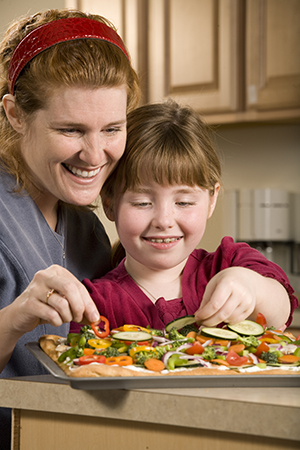Prevention of Heart Disease Starts in Childhood

You may think of heart disease as a problem for adults, not for your young children. But, the CDC says obesity affects 1 out of every 5 U.S. children. Diet and exercise habits started in childhood can start a lifetime of heart health . . . or a lifetime of heart damage.
Some of the causes of adult heart disease that start in childhood and can be prevented are:
Obesity
Buildup of plaque (or fat deposits) in the arteries
Unhealthy changes in cholesterol levels
High blood pressure
Diabetes
Exposure to cigarette smoke
Lack of physical exercise (sedentary lifestyle)
Unhealthy diet
Although it’s true that heart disease risk can run in families, a healthy diet can help every child reduce heart disease risk. If heart disease does run in your family, talk with your child’s healthcare provider about whether to have his or her cholesterol and blood pressure measured regularly, in addition to watching weight.
Healthy food, healthy hearts
A balanced diet is important for children and teens, not just to prevent heart disease, but also to encourage healthy growth and development. A diet that prevents heart disease contains two important parts. The first is keeping daily calories at the right level. Eating too many calories can cause weight gain. This is hard on the heart. The second is limiting fat. The USDA recommends that children limit the amount of fats — especially saturated fats — that they eat. Saturated fat is solid at room temperature.
Here are guidelines for creating a heart-healthy childhood diet:
Breastfeed infants as long as possible. Aim for a full year, even as you introduce solid foods.
Feed your child mostly fruits and vegetables, with whole grains, lean protein, and low-fat dairy.
Watch portion sizes. The recommended daily amounts of healthy foods for children are:
2 ounces of lean protein (fish, chicken) every day for children between 2 years and 3 years old, 3 ounces to 4 ounces for children 4 years to 8 years old, and 5 ounces to 6 ounces for children 9 years to 18 years old
2 cups of low-fat dairy for children under 8, and 3 cups for children 9 years to 18 years
1.5 cups of fruit
2.5 cups of vegetables
6 ounces of whole grains
Don't eat fast food too often. If you do eat out, make healthy choices (like a grilled chicken sandwich instead of a bacon cheeseburger) and keep portion sizes reasonable.
Don't give your children sugary drinks. Instead, serve water and low-fat milk.
The American Academy of Pediatrics advises children younger than 1 year of age should not be given any fruit juice. This is because it does not have any nutritional benefit for babies They also recommend no more than 4 ounces of 100% juice for children ages 1 to 3 years, no more than 4 to 6 ounces for children ages 4 to 6, and, no more than 8 ounces of juice per day for children age 7 and older.
Total fat should be no more than 30% to 35% of total daily calories for children 2 years to 3 years old and 25% to 35% of calories for those up to 18 years old. Choose healthier fats: the mono- and polyunsaturated fats.
Choose whole grains like brown rice over refined grains like white rice for added nutrients and fiber.
Don’t require children to finish everything on their plate. Allow children to tell you when they feel full and are done.
Healthy lifestyle, healthy heart
Many daily choices that children and teens make affect their heart disease risk. Here are some choices you can encourage your children and teens to make that will help protect their hearts:
Get about 60 minutes of moderate to vigorous physical activity most days of the week in childhood. This can be broken up throughout the day into 2 or more periods of activity.
Since many kids trade being active for sitting in front of the television or a computer, keep screen time to less than 2 hours per day.
Don’t expose your kids to cigarette smoke. Ban smoking in your house and car. Don't take your kids to places where people smoke cigarettes. If you smoke, quitting smoking can help you and your kids.
Remember that you are the most important role model for your kids. Your children and teens will learn their best heart healthy choices by watching you.
Connect with us:
Download our App: